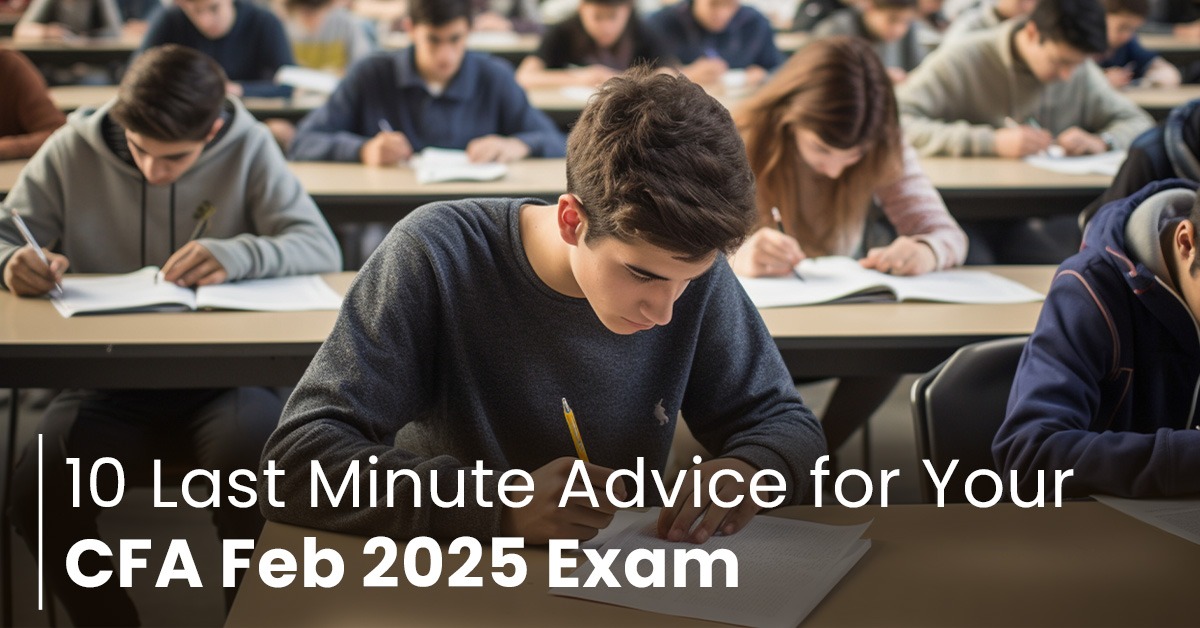Your CFA exam is just around the corner. And you find that your mind is racing, your notes are everywhere and no matter how much you revise, it never feels enough.
The pressure is real, but so is the opportunity to make these final days count.
Last minute prep can feel overwhelming, but when done right, it can be your biggest asset.
The key isn’t to cram blindly but to focus on high-impact strategies that sharpen your recall and boost your confidence.
So, instead of drowning in endless pages, let’s cut through the noise.
In this guide, you’ll discover some ground-breaking last minute advice, like:
If you’re ready to maximize your chances and perform at your absolute best, let’s get started.
6 Essentials You Need to Know For Your CFA Feb 2025 Exam
The CFA exam is tough, no doubt.
It demands:
- Dedication: You’ve put in the hours, now trust your prep.
- Discipline: Sticking to a study plan and revising smartly.
- Strategy: Knowing where to focus and how to manage your time on exam day.
1. Keep your cool:
If there’s one thing that will help you perform better, it’s staying calm. Stress will only make it harder to recall what you already know.
→ Take breaks—watch something light, go for a walk, or just breathe.
→ Eat well—good food = good brain function.
→ Sleep properly—your brain needs rest to retain information.
2. Show up for the exam—No matter what:
I know self-doubt can creep in.
Maybe you feel like you didn’t study enough, or the fear of failure is making you think, Should I even go?
No matter what, NEVER skip the exam.
You paid for it, so sitting out won’t save you money.
Even if you feel unprepared, go and take that test. The CFA exam is as much about the experience as it is about passing.
Who knows? You might surprise yourself.
3. Focus on Your Weakest Areas First:
A quick trick: Grab a piece of paper and write down as many formulas as you can from memory.
Struggling with some?
That’s your weak spot.
Work on those areas first, it’ll give you the most improvement in the shortest time.
4. Revision techniques:
Going through your notes mindlessly won’t help, this will:
- Practice active recall:
Instead of passively reading, test yourself by writing down formulas and key concepts from memory, then check what you missed.
- Use Feynman technique:
Explain complex topics in your own words as if teaching a beginner. If you struggle, revisit weak areas until you can simplify them with ease.
- Spaced repetition:
Focus on high-weight topics first, then review them in short, spaced intervals rather than cramming everything at once and save yourself from last minute burnouts.
5. Exam day must-haves:
Don’t forget these essentials:
- CFA-approved calculator
- Valid passport (double-check the expiration date!)
- Printed and signed admission ticket
- Pencils, eraser, and a fresh mindset
6. Manage your time during the exam:
90 seconds per question, please don’t get stuck!
Eliminate wrong choices if unsure.
If a question is tough, move on and return later.
Don’t waste your time wondering mindlessly, you don’t have a lifetime to pass the exam.
In the end, you’ve done the work, now’s the time to execute.
The CFA exam is a mental marathon.
So pace yourself, stay confident, and give it your best shot.
Top 10 Last Minute Advice for the CFA exam
The final days before your CFA exam can make a big difference in how well you perform on exam day.
You’ve spent over 300 hours studying, facing moments of:
- Stress
- Frustration
- Maybe even a celebration.
Now, with just a few days left, it’s time to focus on what truly matters.
Here’s a practical, and realistic approach to ensure you walk into the exam hall feeling confident and prepared.
1. Pay attention to the wording of questions:
CFA exam questions are tricky.
Sometimes, they test how well you understand the wording rather than just your knowledge.
Read carefully and ensure you know exactly what’s being asked before selecting your answer.
2. Tackle high-weight topics first:
Not all sections carry the same weight.
For each stage of the CFA exam, certain topics have higher scoring potential.
- Ethics is critical, and there’s a strong belief that if you’re borderline on passing, a good Ethics score might push you over the line.
- FRA, Fixed Income, and Equity also hold significant weight, so prioritize these.
3. Listen to the Proctors:
On exam day, proctors strictly enforce rules.
A minor mistake, like:
- Looking around too much
- Having an extra piece of paper
- Using a non-approved calculator can jeopardize your attempt.
Follow instructions carefully to avoid unnecessary stress.
4. Bring a backup calculator:
Only two calculators are allowed:
- Texas Instruments BA II Plus
- HP 12C
Make sure you know how to use yours well especially for:
- TVM
- Bond pricing
- Cash flow calculations.
If possible, bring a spare calculator in case your primary one malfunctions.
5. Pull back from the material and test yourself:
At this stage, you know more than you think.
Instead of passively reading, test your recall:
- Close your books and write down key formulas from memory.
- Try explaining key concepts out loud as if you’re teaching someone.
- Identify weak spots and only revise what’s necessary.
6. Review your notes instead of heavy textbooks:
Now is not the time to go through long chapters.
Stick to:
- Your handwritten notes
- Flashcards
- Summaries of core concepts
This will help you retain more information without feeling overwhelmed.
7. Master definitions and formulas with simple resources:
The CFA exam loves testing definitions and formula applications.
If something still confuses you, look for easy explanations on websites like Investopedia instead of overcomplicating things.
8. Don’t take a full mock exam the day before:
Taking a mock exam the day before your test is a bad idea, it’s like running a marathon the day before an actual marathon.
You’ll tire yourself out and risk a confidence dip if you score lower than expected.
→ Instead, go through past mistakes from previous mocks and review weak areas.
9. Get a good night’s sleep:
Your brain needs rest to function at its best.
Cramming late into the night before the exam will only hurt your performance.
→ Aim for at least 7-8 hours of sleep so you can think clearly during the test.
10. Relax and do something that boosts your mood:
Nerves are natural, but don’t let stress consume you.
Do something that helps you relax and reset your mind.
Whether that’s:
- Reading books
- Exercising
- Maybe watching a lighthearted show, anything that boosts your mood will help you perform better.
You’ve put in the effort, now walk into the exam knowing you’ve done everything you could.
Good luck!
Conclusion
As a CFA Level 1 candidate, the final stretch before the exam can feel overwhelming.
You’re bombarded with advice on:
- Reddit threads
- Analyst forums
- Past candidates
- Friends—all offering different takes on what works best.
The truth? There’s no one-size-fits-all strategy.
Take in the information, but filter it through with:
- What aligns with your study style
- Pace, and peace of mind.
What works for others may not work for you, and that’s okay.
If your approach feels different from the majority, don’t second-guess yourself.
The key is to focus on what truly helps you retain and recall information effectively.
We hope this last minute advice helps you navigate these final days with confidence.
- Pick the strategies that suit you best
- Trust your preparation
- Walk into the exam hall with a clear mind.
You’ve got this.
Best of luck!



